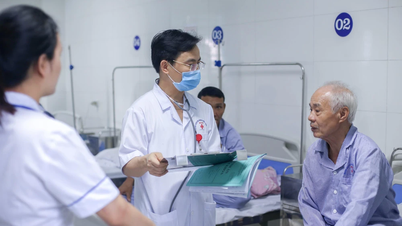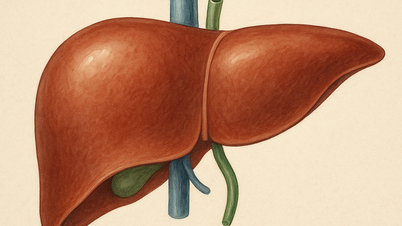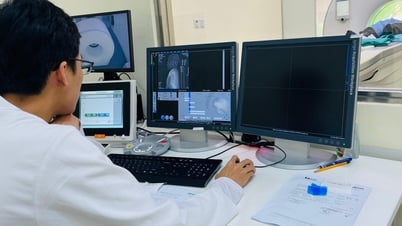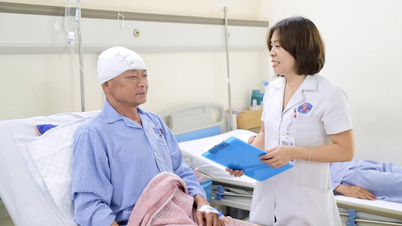The workshop brought together leading domestic and international experts to share experiences in implementing and orienting the development of a comprehensive lung cancer screening program for Vietnam.
Professor, Dr. Le Van Quang, Director of K Hospital, Director of the Institute for Cancer Prevention and Control, emphasized: Lung cancer is currently the second leading cause of cancer death in Vietnam, after liver cancer. If detected early, the chance of successful treatment can increase many times over. Building an effective screening program and disease management system is urgent.
According to Globocan 2022, Vietnam records 24,426 new cases and more than 22,597 deaths from lung cancer each year, with a 5-year survival rate of only about 14.8%.
Associate Professor, Dr. Do Hung Kien, Deputy Director of K Hospital, said that lung cancer treatment is a multi-modal treatment. Currently, there are many advances in the treatment of lung cancer from early to late stages.
For early-stage patients, the standard treatment in Vietnam is surgery followed by adjuvant targeted or immunotherapy. The key to improving survival remains early detection screening (low-dose CT).
However, there is a need for health insurance support policies to increase access to new therapies and early diagnosis screening for lung cancer patients to prolong life; at the same time, reducing drug prices to increase access to new treatments for patients.
Experts discuss at the workshop. |
Sharing at the workshop, Professor, Dr. Pan-Chyr Yang from Taiwan (China) introduced the TALENT model that helps detect up to 90% of stage 0-I lung cancer cases in non-smokers, while promoting changes in national health policy.
Professor, Dr. Kim Yeol from Korea shared his experience in implementing a nationwide screening program, especially emphasizing the importance of quality control and data connection from registration to treatment.
On the domestic side, they also updated on the treatment advances and lung cancer registration system in Vietnam, serving policy planning and improving the effectiveness of disease management.
Dr. Nguyen Trong Khoa, Deputy Director of the Department of Medical Examination and Treatment Management (Ministry of Health) affirmed: “Building a national lung cancer screening program is a strategic direction to reduce the burden of disease. The success of the program requires close coordination between medical facilities, professional synchronization, quality control and effective exploitation of cancer registration data to improve the effectiveness of screening and early detection of the disease.”
Dr. Nguyen Minh Hang, Deputy Director of the Department of Disease Prevention (Ministry of Health), emphasized the importance of connecting non-communicable disease surveillance data with the cancer registration system, to ensure information synchronization, support the evaluation of screening program effectiveness and build evidence-based policies.
Meanwhile, Associate Professor, Dr. Tran Thi Thanh Huong, Deputy Director of the Institute for Cancer Prevention and Control, shared about the challenges in implementing lung cancer screening in the community, especially people's awareness, access to screening services as well as organizational capacity at the grassroots level, and proposed solutions to enhance communication and multi-sectoral coordination to improve the effectiveness of screening on a large scale.
Official launch of research on Lung Cancer Registry in Vietnam. |
At the workshop, the Institute for Cancer Prevention and Control officially announced the launch of the study "Recording lung cancer: Diagnosis, treatment and survival characteristics of patients in Vietnam in the period 2025-2030" co-chaired by Professor, Dr. Le Van Quang and Associate Professor, Dr. Tran Thi Thanh Huong, with the participation of 8 hospitals nationwide, including: K, Central Lung, Ho Chi Minh City Oncology, Hanoi Oncology, Can Tho Oncology, Da Nang Oncology, Pham Ngoc Thach (Ho Chi Minh City).
The aim of the study is to build a database to serve policy planning and improve the quality of care for lung cancer patients in the future.




![[Photo] President Luong Cuong presents the decision to appoint Deputy Head of the Office of the President](https://vphoto.vietnam.vn/thumb/1200x675/vietnam/resource/IMAGE/2025/5/8/501f8ee192f3476ab9f7579c57b423ad)
![[Photo] Prime Minister Pham Minh Chinh meets with the Policy Advisory Council on Private Economic Development](https://vphoto.vietnam.vn/thumb/1200x675/vietnam/resource/IMAGE/2025/5/8/387da60b85cc489ab2aed8442fc3b14a)

![[Photo] National Assembly Chairman Tran Thanh Man chairs the meeting of the Subcommittee on Documents of the First National Assembly Party Congress](https://vphoto.vietnam.vn/thumb/1200x675/vietnam/resource/IMAGE/2025/5/8/72b19a73d94a4affab411fd8c87f4f8d)
![[Photo] General Secretary concludes visit to Azerbaijan, departs for visit to Russian Federation](https://vphoto.vietnam.vn/thumb/1200x675/vietnam/resource/IMAGE/2025/5/8/7a135ad280314b66917ad278ce0e26fa)











![[Photo] Prime Minister Pham Minh Chinh meets with the Policy Advisory Council on Private Economic Development](https://vphoto.vietnam.vn/thumb/402x226/vietnam/resource/IMAGE/2025/5/8/387da60b85cc489ab2aed8442fc3b14a)

![[Photo] National Assembly Chairman Tran Thanh Man chairs the meeting of the Subcommittee on Documents of the First National Assembly Party Congress](https://vphoto.vietnam.vn/thumb/402x226/vietnam/resource/IMAGE/2025/5/8/72b19a73d94a4affab411fd8c87f4f8d)
![[Photo] President Luong Cuong presents the decision to appoint Deputy Head of the Office of the President](https://vphoto.vietnam.vn/thumb/402x226/vietnam/resource/IMAGE/2025/5/8/501f8ee192f3476ab9f7579c57b423ad)


































![[Photo] Prime Minister Pham Minh Chinh talks on the phone with Singaporean Prime Minister Lawrence Wong](https://vphoto.vietnam.vn/thumb/402x226/vietnam/resource/IMAGE/2025/5/8/e2eab082d9bc4fc4a360b28fa0ab94de)

































Comment (0)